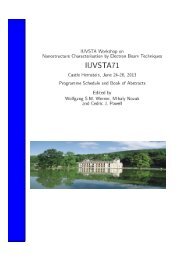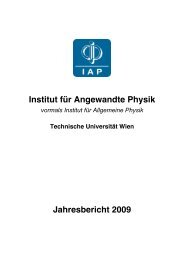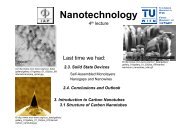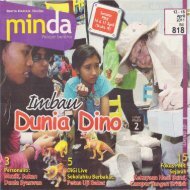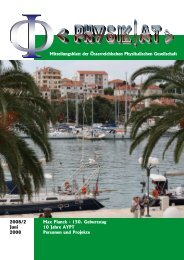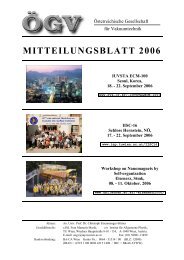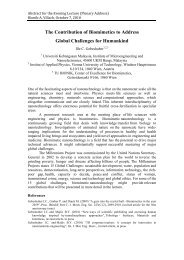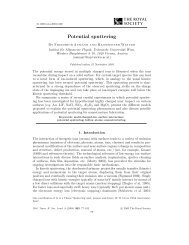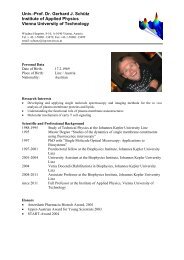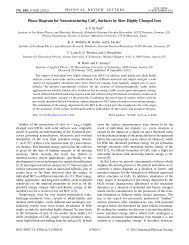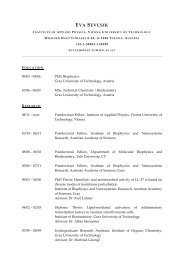nanoscience and society - IAP/TU Wien
nanoscience and society - IAP/TU Wien
nanoscience and society - IAP/TU Wien
You also want an ePaper? Increase the reach of your titles
YUMPU automatically turns print PDFs into web optimized ePapers that Google loves.
238 Federal Institute for Risk Assessment (German)<br />
in food, consumer products, or cosmetic products. For<br />
example, particle sizes have not been defined in the purity<br />
criteria for the authorized food additives silicon dioxide<br />
(E 551) <strong>and</strong> titanium dioxide (E 171).<br />
See Also: Germany; Health <strong>and</strong> Environmental Risks<br />
(Netherl<strong>and</strong>s); Nanomaterials; Nanosilver; Nanotoxicology;<br />
Titanium Dioxide; Zinc Oxide.<br />
Further Readings<br />
Cameron, Nigel <strong>and</strong> M. Ellen Mitchell, eds. Nanoscale: Issues<br />
<strong>and</strong> Perspectives for the Nano Century. Hoboken, NJ:<br />
Wiley-Interscience,2007.<br />
Federal Institute for Occupational Safety <strong>and</strong> Health (FI<br />
OSH), Germany. www.baua.de (cited July 2009).<br />
Grassian, Vicki H., ed. Nanoscience <strong>and</strong> Nanotechnology:<br />
Environmental <strong>and</strong> Health Impacts. Hoboken, NJ: John<br />
Wiley & Sons, 2008.<br />
Shatkin, Jo Anne. Nanotechnology: Health <strong>and</strong> Environmental<br />
Risks (Perspectives in Nanotechnology). Boca Raton, FL:<br />
CRC Press, 2008.<br />
Ille C. Gebeshuber<br />
Vienna University of Technology<br />
Mathias Getzlaff<br />
University of Dusseldorf<br />
Federal Institute for Risk<br />
Assessment (German)<br />
The German Federal Institute for Risk Assessment<br />
(Bundesinstitut fur Risikobewertung, or BfR) is an agency<br />
under public law with the task of strengthening consumer<br />
health protection, <strong>and</strong> heavily engaged in the area<br />
of possible risks of nanotechnology in consumer-relevant<br />
areas <strong>and</strong> in health. The Institute reports to the Federal<br />
Ministry of Food, Agriculture, <strong>and</strong> Consumer Protection,<br />
but is independent when it comes to its scientific<br />
assessments <strong>and</strong> research. BfR has the statutory remit of<br />
identifying potential risks to consumers from foods, substances<br />
<strong>and</strong> products, of assessing them scientifically, <strong>and</strong><br />
of involving all the stakeholders in an active communication<br />
<strong>and</strong> information process. In 2008, for example, more<br />
than 6 million euros were earmarked for research.<br />
In 2005, the Institute established an internal expert<br />
group for nanotechnology. In 2006, the Institute was actively<br />
involved in investigating respiratory problems suffered<br />
by more than 100 consumers, caused by a sealing<br />
spray called Magic Nano, which did not actually contain<br />
any nanoparticles. Together with the Federal Office for<br />
Health <strong>and</strong> S~fety <strong>and</strong> the Federal Environmental Agency,<br />
a research strategy to identify the potential risks of nanotechnology<br />
was published in 2007. Furthermore, BfR is<br />
active in the scientific bodies that deal with the regulation<br />
of nanotechnology at a national or European level.<br />
BfR has also conducted <strong>and</strong> funded a series of dialogue<br />
<strong>and</strong> research activities on the risks of nanotechnology.<br />
In order to determine how nanotechnology is perceived<br />
by the German population, one BfR project conducted<br />
research into the public perceptions of nanotechnology<br />
by means of a representative population survey, coupled<br />
with a qualitative psychological study. Parallel to this,<br />
BfR conducted a consumer conference, an expert survey<br />
<strong>and</strong> a media analysis of the subject. This was followed<br />
by consumer- <strong>and</strong> product-orientated studies on the<br />
risk perception <strong>and</strong> the framing of nanotechnology in<br />
spontaneous online discussions (in online forums <strong>and</strong><br />
weblogs), as opposed to organized online dialogues.<br />
All these activities share the common goal of providing<br />
orientation <strong>and</strong>, by extension, maintaining the<br />
ability of <strong>society</strong> to respond in an informed manner to<br />
a new, complex technology <strong>and</strong> guaranteeing the safe,<br />
responsible h<strong>and</strong>ling of nanotechnology <strong>and</strong> its products.<br />
BfR research activities are also designed to identify<br />
risks or risk areas that are present in the public perception<br />
in a manifest, latent or potential manner, <strong>and</strong> to<br />
describe factors that impact risk communication in this<br />
new area. The Institute's research <strong>and</strong> dialogue activities<br />
play an important role in Germany's overall strategy<br />
for dealing with the health, environmental, <strong>and</strong> safety<br />
issues <strong>and</strong> the ethical, legal, <strong>and</strong> societal implications of<br />
nanotechnology.<br />
See Also: Federal Institute for Occupational Safety <strong>and</strong><br />
Health (Germany); Germany; Magic Nano; Nano Initiative<br />
Action Plan 2010 (Germany).<br />
Further Readings<br />
Bundesinstitut fur Risikobewertung (BfR). http://www.bfr<br />
.bund.de/cd/template/index3n (cited August 2009).<br />
Garreau, J. Radical Evolution. New York: Doubleday, 2004.<br />
Christopher Coenen<br />
Karlsruhe Institute of Technology



